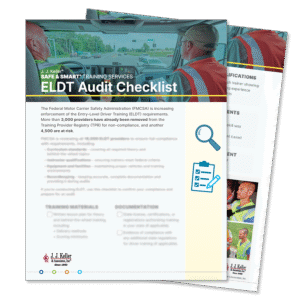When many people think of a “job interview,” they think of a candidate wearing a suit, printing up a handful of resumes and visiting some corporation to be interrogated by a high-level manager who decides whether to make the hire. For some businesses, that’s how it works. It’s also a scenario that doesn’t apply for truck driving positions. Still, there’s an “interview” just the same.
In trucking, it’s usually not a matter of selecting the best candidate for the job. Trucking companies that can turn away qualified drivers after choosing the “best” are pretty rare. In this industry, getting hired is very much a matter of qualifications and record. This is where many candidates go wrong.
Whether you apply through an online job board or directly to the carrier’s website, you must include an application that contains some information mandated by the Federal Motor Carrier Safety Administration (FMCSA). Sooner or later, an application will be filled out.
Beyond that is the interview process. This process might include several phone conversations, emails or text messages before an employment offer is extended. That offer, however, is “conditional.” When you get to orientation, the carrier will gather more information. That’s another part of the interview process. If the carrier doesn’t get everything they need for the file, you won’t be hired.
From the first contact with a recruiter, the information-gathering process begins. Regulations state each carrier must check your background. For example, your record must include prior employers — that’s ALL of them — for the past three years. For jobs you’ve had that are regulated by the Department of Transportation, that history goes back 10 years. In other words, if you tell a recruiter you have a million miles of safe driving but only list four years of employment, your story will be suspect. If you mention only the carriers with whom you had a good record and omit those where you wrecked trucks, failed drug screens or had other issues, your integrity will be questioned.
Your driving record will be checked, too. If you claim to have no convictions for traffic violations or accidents — yet your motor vehicle report lists several of each — your application will be denied in a hurry. The more discrepancies the carrier finds in your story, the more likely they’ll pass on employing you.
Some applicants fail to mention major items such as criminal records, accidents or license suspensions. When the carrier finds out you omitted information, you aren’t likely to be hired, even if the infraction wouldn’t have stopped them from hiring you.
If you’re applying for a job in the trucking industry, remember some simple steps.
- Know what’s in your record.
- Order your own reports.
- Disclose everything that’s on the record, and some that isn’t.
- Have everything you need to complete the paperwork close at hand.
An added benefit of ordering your own reports is that you’ll know what ISN’T on your record before you disclose it.
Many of the documents a prospective carrier will check are available to you. Here’s a list:
MVR (Motor Vehicle Report): You can typically get one from the same agency that issued your commercial driver’s license (CDL). Some states only record traffic citations, while others record warnings, accidents and even inspections. Get a copy and read it, before the carrier does.
PSP (Pre-Employment Screening Program): This report contains information from inspections and accidents you’ve had in the past two to three years. It can contain questionable information. For example, if you’re pulled over for speeding and the officer does a truck inspection, “speeding” can show up on your PSP, even if you never got a ticket, you got a warning, or you were acquitted in court. Accidents can be listed, even when you weren’t at fault. You can order yours on on the FMCSA website here.
“DAC” prior employment reports: A company called Hire-Right keeps information reported by carriers and reports it to those who request it. This information includes dates of employment, job type, whether your performance was satisfactory, reason for termination and more — including whether the carrier would rehire you and comments entered by the carrier. If you claim you left a carrier for “higher pay” but the carrier says that you were fired due to safety issues, you may not get hired. Some drivers are surprised to find entries of truck abandonment or misappropriation of company funds. Order a free copy of your record at hireright.com/background-checks. You also have the right to contest entries on your record. Some carriers may use other reporting agencies for their background checks, but by law you’re entitled to a copy of their records, too.
Drug & Alcohol Clearinghouse: The FMCSA maintains a website where employers are required to report failed tests or refusals to test for controlled substances. The carrier must have your consent to check your record, but you have to register at the Clearinghouse before they can check. Register at clearinghouse.fmcsa.dot.gov/register. You can also order a copy of your record to see what’s been reported. Some drivers have left a company during orientation, only to find the carrier reported a refusal to test.
Court records that are applicable to the position you are applying for: If you’ve been convicted of a crime, or even acquitted of a serious charge, your court case is on file somewhere. In some cases attorneys can enter a plea on your behalf without your presence, creating a record you’ve never even seen. Many counties have a county recorder, and in some states there’s a state agency. Have copies of the final disposition of your case(s). If an arrest shows up in a criminal history report and you have a court record, you’ll be able to show the carrier that you have nothing to hide.
If you’re denied employment, you can request copies from the carrier of any consumer reports used to make the decision. That process takes time, and you won’t know for sure if there were other reasons you were declined.
If you’re planning to apply for a new trucking job, knowing what’s on your record will help you avoid unpleasant surprises and breeze through the hiring process.
Cliff Abbott is an experienced commercial vehicle driver and owner-operator who still holds a CDL in his home state of Alabama. In nearly 40 years in trucking, he’s been an instructor and trainer and has managed safety and recruiting operations for several carriers. Having never lost his love of the road, Cliff has written a book and hundreds of songs and has been writing for The Trucker for more than a decade.














